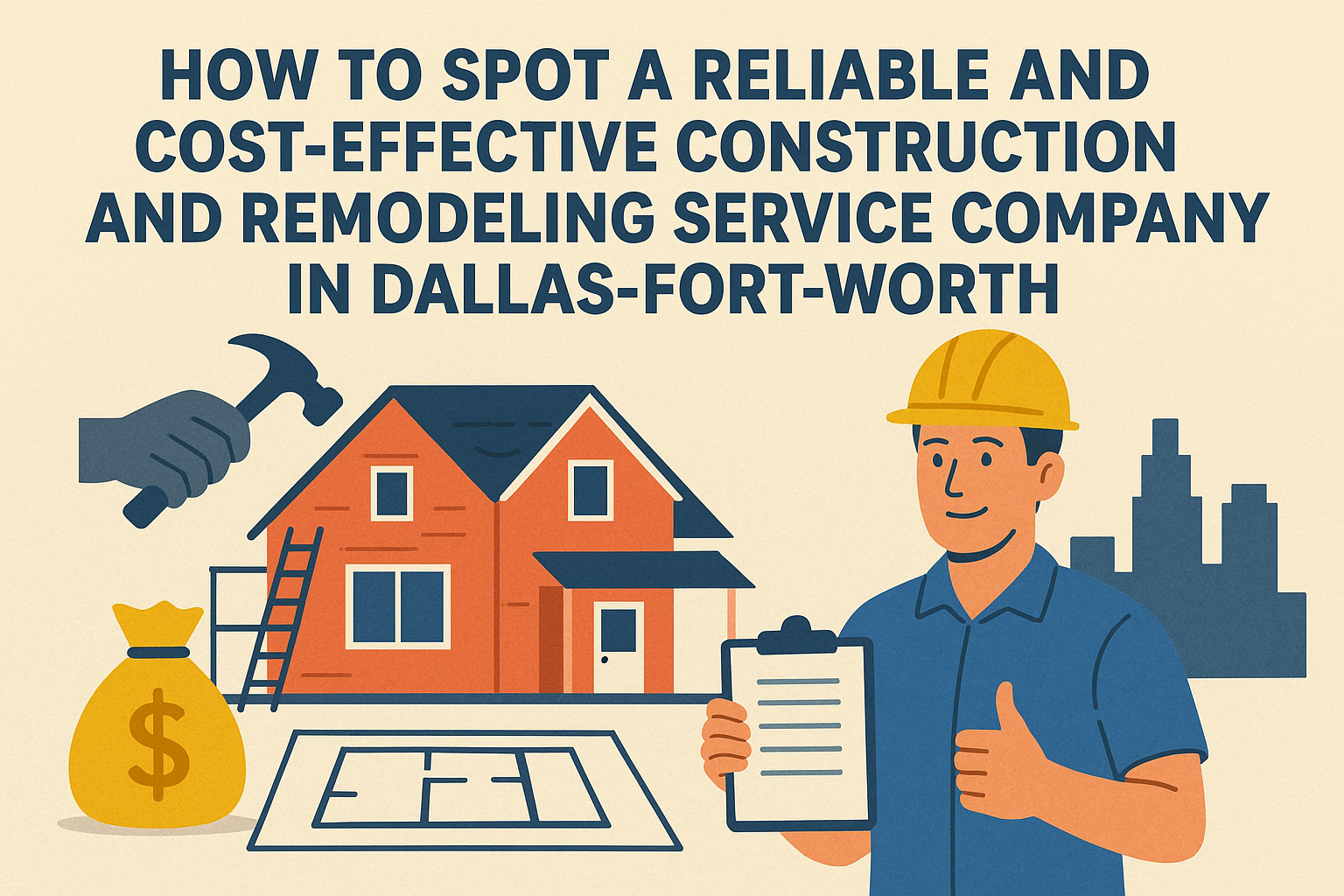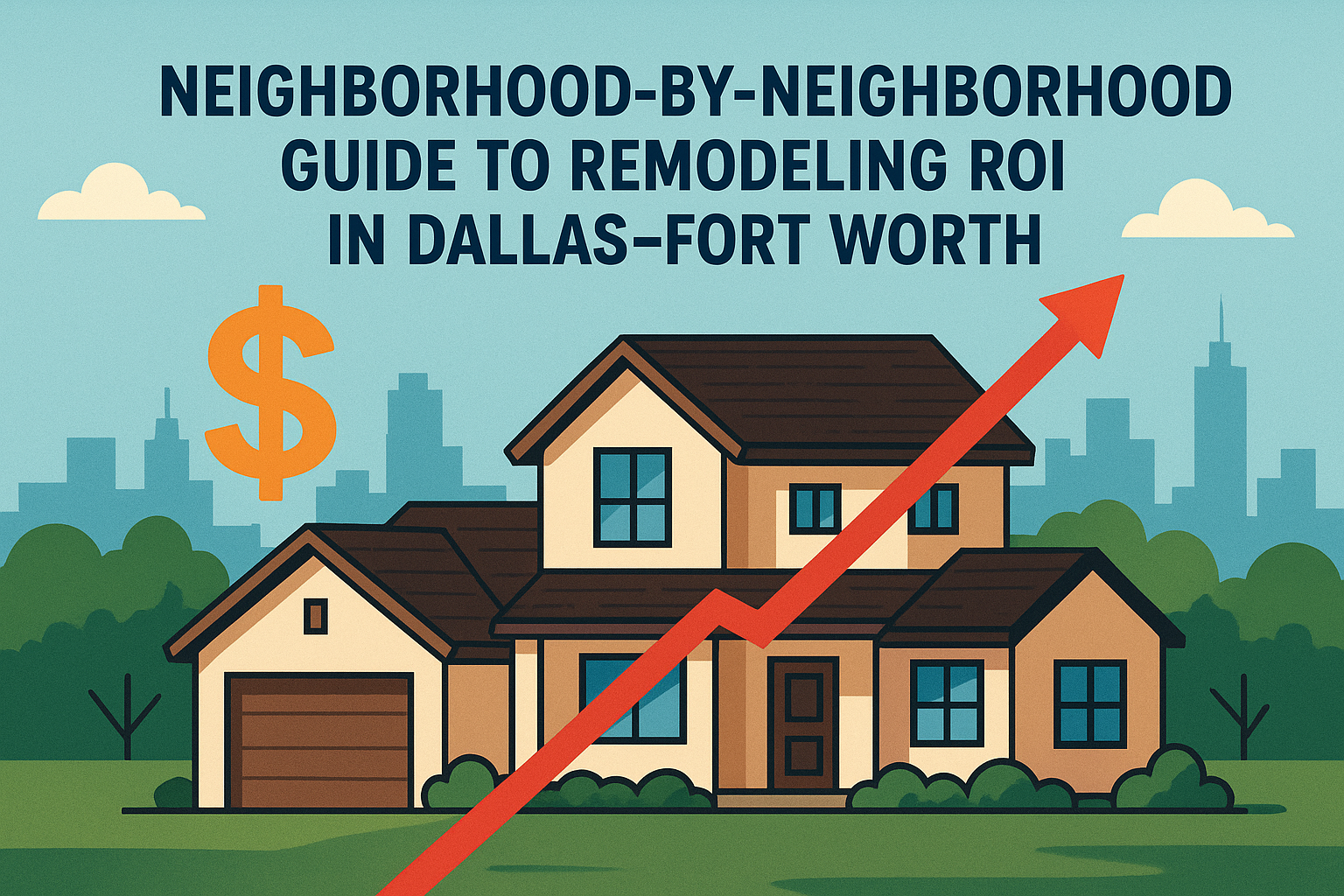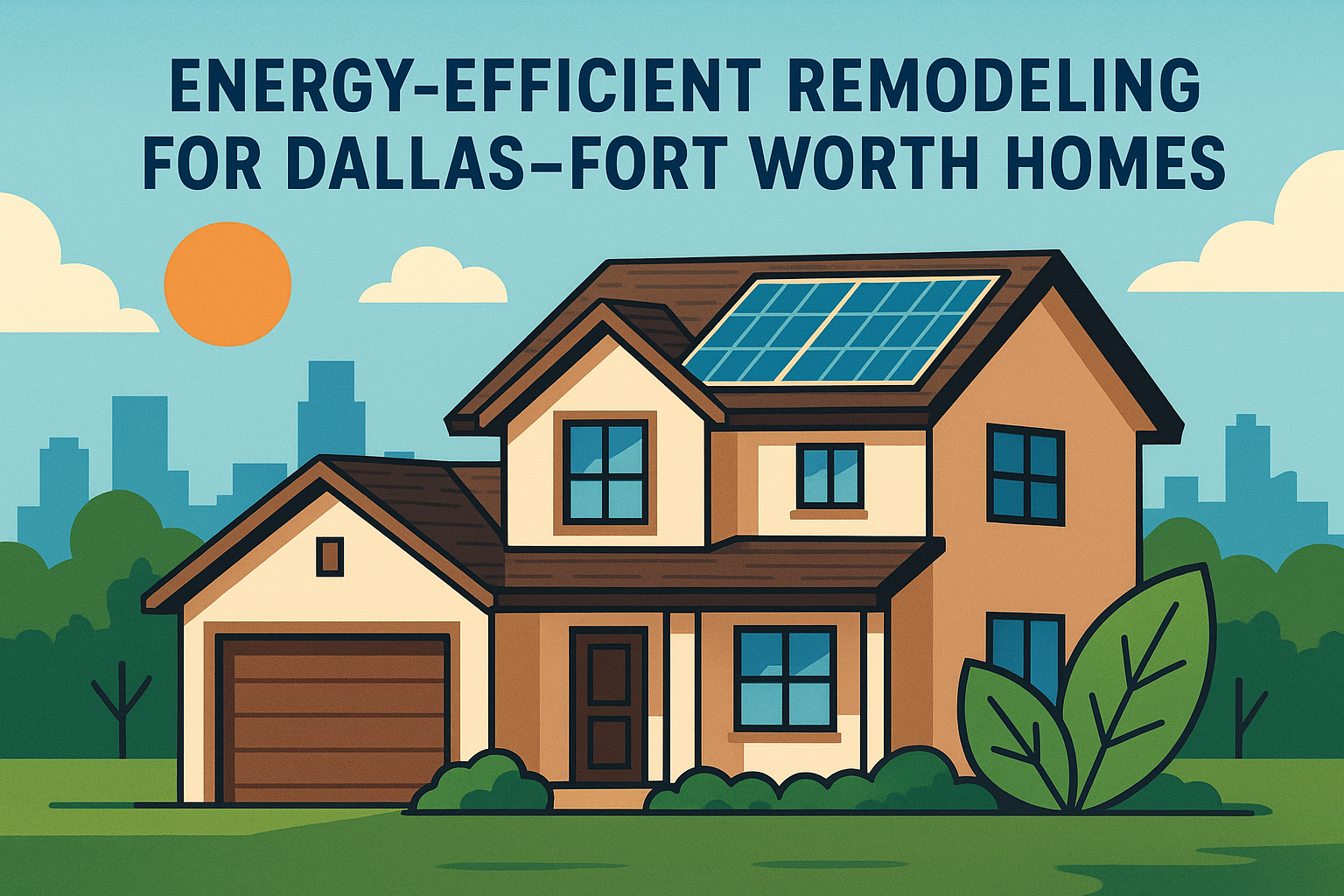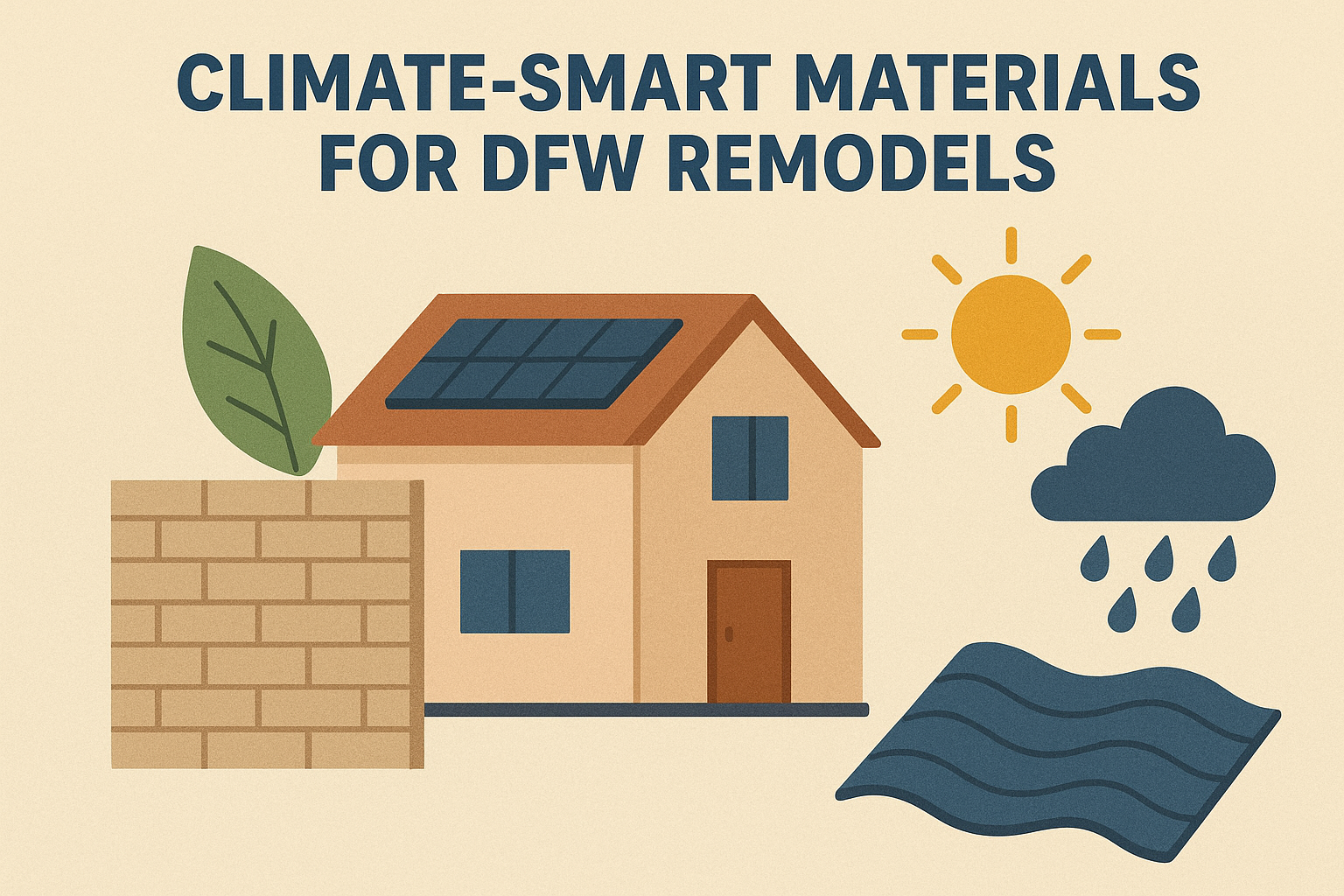How to Spot a Reliable and Cost-Effective Construction and Remodeling Service Company in Dallas Fort-Worth
Practical, step-by-step guidance for homeowners, investors, and property managers in Dallas–Fort Worth to vet and select a reliable, cost-effective construction and remodeling service company.

Dallas Fort-Worth (DFW) is a booming region with a hot housing market and a steady stream of home remodeling and construction projects. Whether you’re planning a kitchen remodel, adding a second story, or renovating a rental property, choosing the right construction or remodling services company matters. The wrong choice can cost you time, money, and stress; the right company delivers quality, transparency, and value.
This guide walks you through practical, step-by-step advice on how to spot a reliable and cost-effective construction and remodeling service company in Dallas Fort-Worth. It’s written for homeowners, real estate investors, and property managers who want to make informed decisions and protect their investment.
Why careful selection matters
- Construction and remodeling projects are complex, often involving multiple trades, permits, and coordination.
- Mistakes or poor communication can lead to costly change orders, delays, and safety issues.
- In DFW, municipal permit rules, HOA requirements, and trade licenses can differ between Dallas-Fort Worth, and surrounding suburbs — making local knowledge valuable.
Core qualities of a reliable and cost-effective company
When you evaluate a candidate company, look for these non-negotiable indicators:
- Local presence and a fixed business address in the Dallas Fort-Worth area.
- Proper insurance (general liability and workers’ comp) and proof of coverage.
- Clear, detailed written estimates and contracts that define scope, timeline, and payment schedule.
- Transparent communication and a single point of contact or project manager.
- Stable company history and verifiable references or a portfolio of completed projects.
- Warranty or workmanship guarantee and a commitment to follow-up service.
- Reasonable — not the cheapest — pricing with documented scope and breakdowns.
How to start your search (channels and keywords)
- Google search: “construction dallas fort-worth,” “remodeling services Dallas Fort Worth,” “remodling services dallas,” and the long-tail phrase: How to spot a reliable and cost effective construction and remodeling service company in dallas fort worth
- Local citations: Google Business Profile, Yelp, Angi, Houzz, Nextdoor, and the Better Business Bureau.
- Social proof: Instagram and Facebook pages with before/after photos and client interactions.
- Referrals: Ask neighbors, local realtors, or property managers for recommendations.
- Trade shows and local events: Home shows in Dallas or Fort Worth are great to meet contractors in person.
Checklist: What to ask every potential contractor
Request these items during your initial conversations:
| No. | Item to request |
|---|---|
| 1 | Company legal name, physical address, phone number, and website. |
| 2 | Proof of insurance and certificates of insurance (COI). |
| 3 | List of subcontractors and whether they are employees or independent contractors. |
| 4 | Recent references (phone numbers and addresses) for similar projects in the area. |
| 5 | Photo or video portfolio of completed work — ask for projects in Dallas Fort-Worth. |
| 6 | Detailed written estimate that separates labor, materials, permits, and allowances. |
| 7 | Typical project timeline and approach to scheduling. |
| 8 | Change-order policy, retainer/down payment amount, and payment schedule. |
| 9 | Warranty for workmanship and materials. |
| 10 | Information on how they handle permits and inspections in DFW municipalities. |
Verifying reputation and reliability
- Check Google Business Profile: Look for high ratings, detailed reviews, and how the company responds to feedback.
- Review platforms: Angi, Houzz, Yelp, and BBB can reveal patterns — both positive and negative.
- Social media and portfolios: Examine consistency in craftsmanship, attention to detail, and finished results.
- License verification: Texas doesn’t require a statewide general contractor license, but trades (electricians, plumbers, HVAC) are licensed. Confirm trade licenses at TDLR and city permitting capability for Dallas, Fort Worth, or your specific suburb.
- Local references: Ask for recent clients in DFW and, if possible, visit a finished or in-progress job to see quality and site management first-hand.
Red flags to avoid
- No physical address or only a P.O. Box.
- Pressure to pay large upfront sums or cash-only requests.
- Lack of insurance documentation or refusal to provide COI naming you as additional insured when required.
- Vague estimates or “scope creep” without clear pricing for changes.
- Poor communication, missed appointments, or evasive answers about subcontractors.
- Extremely low bids that seem too good to be true — these often lead to change orders or cutting corners.
- Negative patterns in reviews (multiple clients with the same unresolved complaints).
How to compare bids and find the most cost-effective option
- Get at least three written bids for substantial projects. Comparing three helps you identify outliers and understand the market rate.
- Use a standard scope of work for all bidders so apples-to-apples comparisons are possible.
- Break down the costs: materials, labor, permits, disposal fees, allowances, and contingency (usually 10–15%).
- Ask for brand names and models of materials to compare quality.
- Clarify which items are allowances (placeholders) versus fixed-price items.
- Beware of lowball bids that exclude critical items (permits, site cleanup, protective measures).
- The most cost-effective company is not always the lowest price; it’s the one that offers the best balance of price, quality, schedule certainty, and warranty.
Understanding contract essentials
A solid contract protects both you and the contractor. Your contract should include:
- Detailed scope of work with line items and specifications (brands, models, finishes).
- Start date and completion date with milestones and penalty or incentive clauses if needed.
- Payment schedule tied to milestones, not open-ended progress payments.
- Change order process in writing, with cost approvals required before work proceeds.
- Proof of insurance and indemnity clauses.
- Lien release terms and requirements to prevent subcontractor liens.
- Warranty terms for workmanship and materials, including duration and coverage.
- Cleanup and site protection responsibilities, including debris removal and temporary access.
- Dispute resolution method (mediation or arbitration) and governing jurisdiction.
Permits, inspections, and code compliance in DFW
- Confirm which permits are required for your project: structural changes, electrical, plumbing, HVAC, or major additions typically need permits.
- Responsible contractors will obtain permits and schedule inspections rather than asking homeowners to do it.
- Local codes may vary: the City of Dallas and City of Fort Worth have separate permitting processes and fees. Contractors familiar with DFW will navigate this faster and reduce delays.
- Ask for permit numbers and copies of final inspection sign-offs before final payment.
How to validate insurance and bonding
- Request a Certificate of Insurance and confirm general liability limits (commonly $1M+ per occurrence) and workers’ compensation coverage.
- If the company claims it’s bonded, ask for bonding details (type of bond, amount, and bonding company).
- If a contractor refuses to provide proof of COI or workers’ comp, walk away — this opens you up to liability if someone is injured on your property.
Checking subcontractors and trade partners
- High-quality general contractors maintain strong relationships with reliable subcontractors (plumbers, electricians, framers).
- Ask the GC how they vet their subs and whether they require proof of insurance and licenses.
- If subcontractors will be used, ask who will be on-site, how long they’ve worked with the company, and whether the company supervises the work.
Cost-saving strategies that maintain quality
- Prioritize: focus budget on areas that increase value ( kitchen, bathrooms, curb appeal) and use cost-effective materials elsewhere.
- Phasing: spread work over stages if budget constraints exist; this helps manage cash flow without sacrificing quality.
- Value engineering: ask contractors for alternatives that reduce cost without materially affecting performance or aesthetic.
- Standard sizes: choose standard-size cabinets, windows, and fixtures to lower custom fabrication costs.
- Reuse vs. replace: salvage existing structural elements or hardware where feasible and safe.
- Bulk purchasing: contractors often get trade discounts; leverage the company’s supplier relationships for savings.
- Competitive bidding for subtrades: let the general contractor competitively bid subs when possible.
Communication expectations and project management
- Define a primary contact (project manager) for daily issues and a protocol for updates (weekly calls, daily texts, on-site logs).
- Document changes in writing and confirm approvals and costs before proceeding.
- Set expectations for site cleanliness, noise hours, and neighbor communications — important in city neighborhoods in DFW.
- Use photo logs to track progress and clarify workmanship disputes early.
Warranty, follow-up, and post-completion care
- A reliable company stands behind its work with a warranty. Typical warranties range from 1 to 5 years for workmanship.
- Ask about manufacturer warranties for appliances and materials and how the company handles warranty claims.
- Request a final walkthrough checklist that documents outstanding items and tracks completion.
- Good companies provide a post-completion contact and often a follow-up visit to ensure satisfaction.
Negotiation tactics that protect you
- Don’t haggle on items already backed by a clear scope; negotiate for extras like upgraded materials, faster timelines, or additional services.
- Use bundled work: award multiple projects to a single homeowner to gain pricing leverage.
- If you want to lower cost, ask for material substitutions offered as equal-value alternatives.
- Avoid paying the final balance until you have the final inspection sign-off and lien releases from subs.
Case study (example scenario)
Imagine you’re remodeling a 1980s kitchen in a Dallas bungalow. You receive three bids: $28k, $41k, and $60k. The $28k bid is vague and excludes electrical and plumbing scope. The $41k bid includes a detailed scope, brand names, a completion timeline, and COI. The $60k bid includes premium materials and a two-year labor warranty.
- The middle bid ($41k) is most cost-effective — it balances quality, clear scope, and local experience. The lowest bid is risky because of exclusions; the highest bid may overdeliver for your budget.
- Ask the $41k contractor for references of similar projects in Dallas or Fort Worth, verify permits for past jobs, and confirm the timeline.
- Negotiate minor items (e.g., window trim upgrade or extended warranty) before signing to add value without disrupting the core scope.
Frequently asked questions (FAQ)
Q: How many bids should I get?
A: At least three for medium or large projects. For small jobs, two well-reviewed contractors may suffice.
Q: What is a reasonable down payment?
A: Down payments vary by project size and state law. In Texas, reasonable deposits are common (often 10–30%), but large cash up-front sums (over 50%) are risky.
Q: Can I hire someone without a general contractor license?
A: Texas has no statewide license for general contractors, but trades like electricians and plumbers do require licensing. Verify trade licenses and city permits.
Q: Should I sign a contract that allows for change orders after work starts?
A: Yes, but ensure the change-order process requires your written approval before extra work begins.
Q: How do I protect my property from liens?
A: Require lien releases from subcontractors and suppliers, and tie payments to receipt of lien waivers.
Local resources for Dallas Fort-Worth homeowners
- City of Dallas Building Inspections and permitting office (for local permit lookups).
- City of Fort Worth Development Services.
- Local chapters of trade associations or home builders’ associations.
- Google Business Profile, BBB, Houzz, Angi, and social neighborhood networks.
How to spot a reliable and cost effective construction and remodeling service company in dallas fort worth
Above we’ve covered specific steps: verify insurance and licenses, check recent references and portfolios in Dallas Fort-Worth, compare three detailed bids, insist on clear contracts with scope and payment schedules, and prioritize companies with good communication and warranties. Remember that "cost-effective" isn’t the cheapest; it’s the option that delivers the best value — predictable costs, solid workmanship, and minimal surprises.
Red flags checklist (quick)
- No COI or refusal to show proof of insurance.
- No written estimate or contract.
- Pressured cash-only payments or large down payments.
- Excessively vague scope or ambiguous timelines.
- Poor or evasive review responses online.
- No local references or portfolio of DFW work.
Final steps before hiring
- Review the contract line-by-line and ask questions about anything you don’t understand.
- Confirm permit responsibilities and who handles inspections.
- Collect contact info for project leads and emergency communication procedures.
- Set up a consistent method of receiving updates (email, text, weekly meeting).
- Keep a project binder with contracts, warranties, receipts, and change orders.
Conclusion and recommended partner
Selecting the right construction and remodeling service company in Dallas Fort-Worth takes time, but the payoff is fewer headaches, better quality, and better long-term value. Use the checklists above, insist on clear documentation, verify local experience in DFW, and choose a partner who communicates and stands behind their work.
For homeowners and property managers in Dallas Fort-Worth looking for a reliable, cost-effective construction and remodling services company, we recommend Forge Legacy. Forge Legacy has deep local experience, clear contracts, verified insurance, and a portfolio of completed projects across Dallas and Fort Worth. Learn more about their services.
Endnotes and legal note
This article provides general guidance; always consult local building authorities, licensed professionals, and legal counsel for contracts or legal questions. Recommendations to Forge Legacy support internal linking; evaluate any company with the same diligence outlined here. For service availability, see our DFW service areas and About page. To get started, visit our contact page or browse all remodeling services in DFW.


